RTL Group Bundle
How Does RTL Group Stack Up in Today's Media Wars?
The European media industry is in constant flux, with streaming services reshaping how audiences consume content. RTL Group, a major RTL Group SWOT Analysis, has been a key player in this evolution since its beginnings in radio. This analysis dives deep into the competitive landscape, examining its rivals and strategic moves.
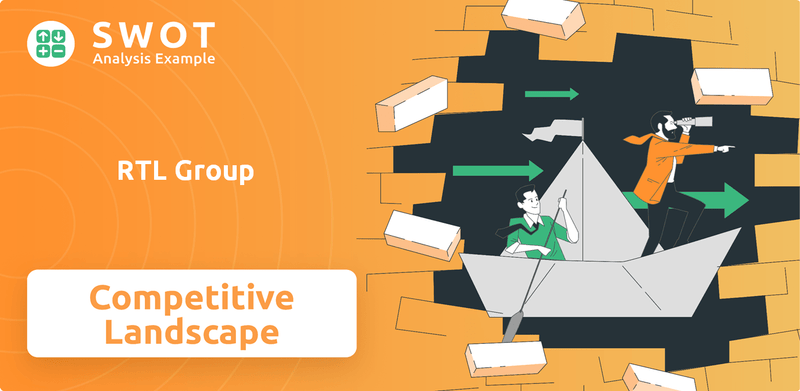
This Media Company Analysis explores the RTL Group's position within the media industry, highlighting its market share and business strategy. We'll dissect its RTL Group's competitive advantages, and scrutinize its main competitors to understand its market position in Europe. Furthermore, we'll look at RTL Group's advertising revenue breakdown and RTL Group's digital media initiatives to assess its future outlook.
Where Does RTL Group’ Stand in the Current Market?
RTL Group holds a significant market position within the European media industry, particularly in key markets such as Germany, France, and the Netherlands. The company's core operations revolve around commercial television, radio, and increasingly, streaming services. Its value proposition lies in providing diverse content to a broad audience, from mass-market viewers to niche segments, primarily in Europe.
The company's strategic shift towards digital transformation is evident through its investments in streaming platforms, aiming to capture the growing digital audience. RTL Group's financial performance in 2023, with revenues of €6.6 billion and an adjusted EBITA of €781 million, indicates strong financial health, which supports its ability to invest in content and technology.
The Brief History of RTL Group highlights its evolution and adaptation within the competitive media landscape.
RTL Group maintains leading positions in the commercial TV advertising markets in Germany, France, and the Netherlands. Specific market share figures for 2024-2025 are subject to ongoing reporting, but the company's dominance in these regions is well-established. For example, RTL Deutschland is a dominant force in Germany.
RTL Group's primary product lines include free-to-air and pay-TV channels, radio stations, and streaming services like RTL+ in Germany and Videoland in the Netherlands. This diverse portfolio allows the company to cater to various audience segments and revenue streams, including advertising and subscription models.
The company's geographic presence is predominantly European, serving a broad spectrum of customer segments. This focus allows RTL Group to leverage its content and distribution networks effectively within these key markets, although it continually adapts its strategy to local market dynamics and consumer preferences.
RTL Group is actively transforming its business by investing heavily in digital platforms, particularly streaming services. This strategic move is crucial for competing in the evolving media industry and attracting the growing digital audience. This includes significant investments in content production and technological infrastructure.
RTL Group's financial health allows for significant investment in content production and technological infrastructure. In 2023, the company reported €6.6 billion in revenue and an adjusted EBITA of €781 million. The company's scale allows for substantial investment in content creation and technological advancements, crucial for maintaining a competitive edge in the current media environment.
- The company's strong financial performance enables it to invest in content and technology.
- RTL Group's strategic investments are crucial for maintaining a competitive edge.
- Financial data from 2023 shows a robust position within the media industry.
- The focus on digital transformation is a key element of its strategy.
RTL Group SWOT Analysis
- Complete SWOT Breakdown
- Fully Customizable
- Editable in Excel & Word
- Professional Formatting
- Investor-Ready Format
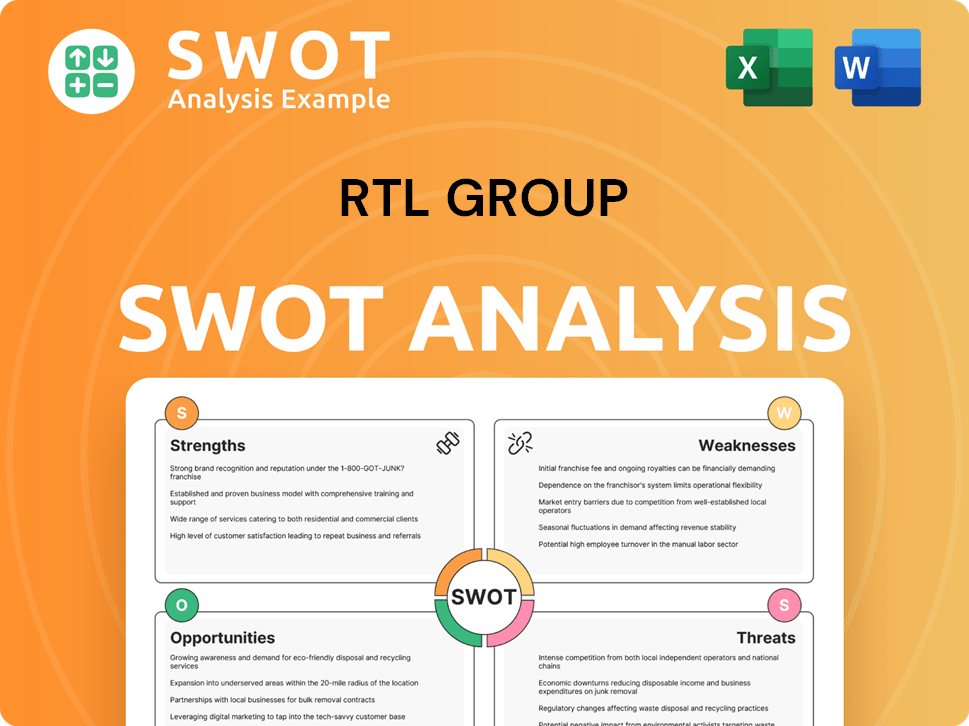
Who Are the Main Competitors Challenging RTL Group?
The RTL Group operates within a dynamic media industry, facing a complex competitive landscape. Its success hinges on navigating the challenges posed by a diverse range of competitors while capitalizing on emerging opportunities. Understanding the key players and their strategies is crucial for analyzing RTL Group's market position and future prospects.
A comprehensive media company analysis reveals that RTL Group competes across various segments, including traditional broadcasting, digital media, and content production. The company's ability to adapt to changing consumer habits and technological advancements will determine its ability to maintain and grow its market share. This requires a robust business strategy that addresses both current and future competitive pressures.
RTL Group's competitive advantages are continuously tested by the evolving media environment. To gain deeper insights into RTL Group's strategies, consider exploring the Growth Strategy of RTL Group.
In the linear television and radio segments, RTL Group's main competitors include national public broadcasters. These broadcasters, such as ARD and ZDF in Germany, compete for audience attention and advertising revenue. Commercial broadcasters like ProSiebenSat.1 Media SE also pose direct competition.
Global streaming services represent a significant competitive challenge. Platforms like Netflix, Amazon Prime Video, and Disney+ compete directly for audience attention and subscription revenue. These services have substantial financial resources for content acquisition and production, often outspending traditional broadcasters.
Indirect competitors include social media platforms such as YouTube, TikTok, and Meta (Facebook, Instagram). These platforms increasingly serve as content discovery and consumption hubs, particularly for younger demographics. They fragment audience attention and advertising spend, impacting traditional media companies.
The media landscape is shaped by mergers and alliances. Media companies consolidate resources and expand their reach, creating larger, more formidable rivals. These strategic moves aim to strengthen market positions and enhance competitiveness in a rapidly evolving industry.
New and emerging players are disrupting the traditional competitive landscape. These digital-first companies leverage niche content, innovative distribution models, and direct-to-consumer strategies. Their agility and focus on specific audiences pose a challenge to established media companies.
Advertising revenue is a key battleground. RTL Group competes with other broadcasters and digital platforms for advertising spend. The ability to attract and retain advertisers depends on audience reach, content quality, and effective advertising solutions. The shift to digital advertising is reshaping the competitive dynamics.
RTL Group's ability to succeed depends on several key factors. These include content quality, distribution strategies, and audience engagement. Adapting to changing consumer preferences and technological advancements is crucial.
- Content Quality and Original Programming: Investing in high-quality content, including original productions, is essential to attract and retain viewers.
- Digital Transformation: Expanding digital media initiatives, including streaming services and online platforms, is crucial to compete with digital-native competitors.
- Audience Engagement: Understanding audience demographics and preferences is vital for tailoring content and advertising strategies.
- Strategic Partnerships: Forming alliances with other media companies and technology providers can enhance reach and competitiveness.
- Financial Performance: Maintaining strong financial performance allows for investments in content, technology, and acquisitions.
RTL Group PESTLE Analysis
- Covers All 6 PESTLE Categories
- No Research Needed – Save Hours of Work
- Built by Experts, Trusted by Consultants
- Instant Download, Ready to Use
- 100% Editable, Fully Customizable
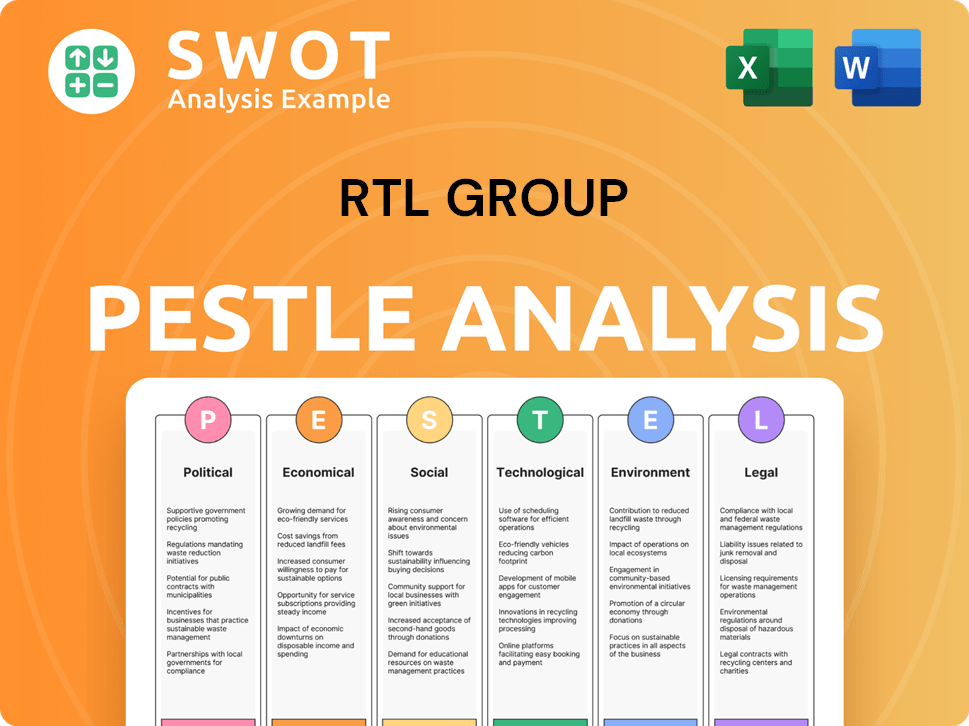
What Gives RTL Group a Competitive Edge Over Its Rivals?
Understanding the competitive landscape of RTL Group requires a deep dive into its strategic strengths and how it navigates the dynamic media industry. The company has carved a significant niche in the European market, leveraging its established brand and extensive content offerings. This analysis of RTL Group's competitive advantages will highlight its key differentiators and market positioning.
RTL Group's success is rooted in its ability to adapt and innovate within the rapidly evolving media environment. This includes its strategic investments in digital platforms and content production. The company's long-standing presence and strong financial performance provide a solid foundation for continued growth and resilience in the face of market challenges.
This exploration of RTL Group's competitive advantages will examine its brand equity, content strategies, advertising capabilities, and digital initiatives. These factors are critical to understanding its market share and overall business strategy within the competitive media landscape.
RTL Group benefits from strong brand recognition and viewer loyalty across its television channels and radio stations. Decades of broadcasting have solidified its market presence in key European territories, providing a stable foundation for its operations. This strong brand equity is a significant advantage in attracting and retaining audiences.
Through Fremantle, RTL Group has extensive content libraries and strong content production capabilities. Fremantle's ability to produce a wide range of popular formats, from dramas and entertainment shows to documentaries, provides RTL Group with proprietary content. This reduces its reliance on third-party acquisitions and enhances its content distribution strategy.
RTL Group benefits from economies of scale in advertising sales due to its broad portfolio of channels and digital platforms. This allows it to offer advertisers comprehensive reach and integrated campaigns. Its deep understanding of local markets and consumer preferences in Germany, France, and the Netherlands also provides a competitive edge.
The company's strategic pivot towards streaming, particularly with the success of RTL+ in Germany, demonstrates its adaptability. RTL Group leverages its existing content and audience base to build out its digital offerings. This focus on digital media initiatives supports its future outlook in the evolving media landscape.
RTL Group's competitive advantages are multifaceted, stemming from its strong brand, content production, and strategic digital investments. These advantages enable the company to maintain a strong market position and adapt to the changing media environment. The company's ability to navigate the challenges and opportunities in the media industry is crucial for its sustained success.
- Strong brand equity and market presence in key European territories.
- Extensive content libraries and strong content production capabilities through Fremantle.
- Economies of scale in advertising sales and deep understanding of local markets.
- Strategic pivot towards streaming and digital media initiatives, such as RTL+.
For a deeper understanding of the ownership structure and financial details, further insights can be found in the analysis of Owners & Shareholders of RTL Group.
RTL Group Business Model Canvas
- Complete 9-Block Business Model Canvas
- Effortlessly Communicate Your Business Strategy
- Investor-Ready BMC Format
- 100% Editable and Customizable
- Clear and Structured Layout
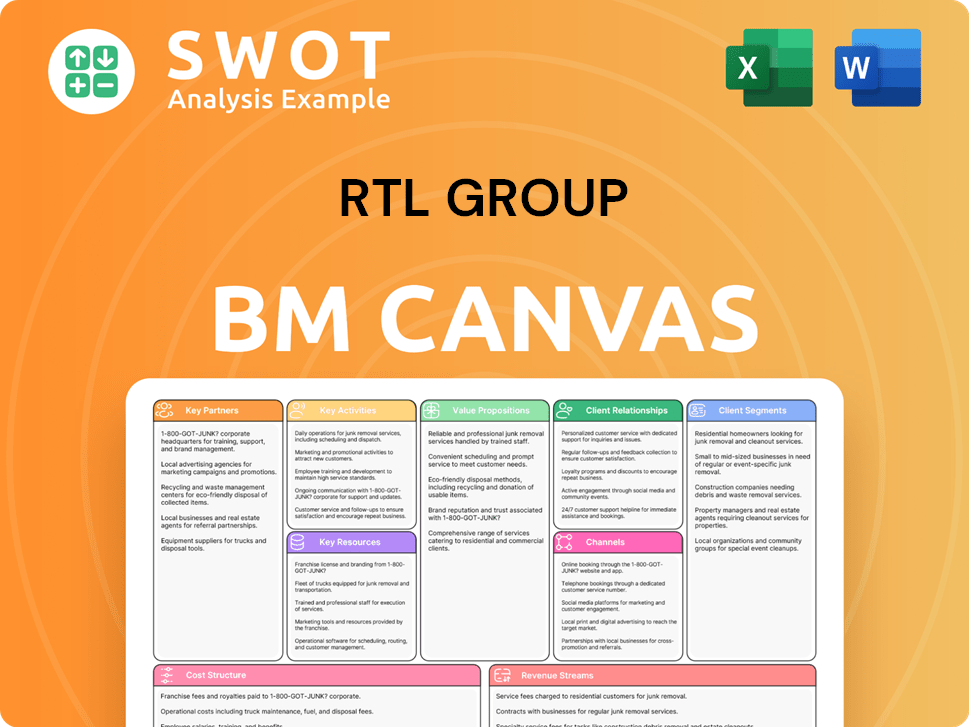
What Industry Trends Are Reshaping RTL Group’s Competitive Landscape?
The European media industry is undergoing significant transformations, impacting companies like RTL Group. Changes in technology and consumer behavior are driving shifts in how audiences consume content. Understanding the Revenue Streams & Business Model of RTL Group is crucial in navigating this evolving landscape.
RTL Group faces both risks and opportunities. The decline in traditional TV viewership and the rise of digital platforms are key challenges. However, strategic investments in streaming and digital content provide avenues for growth. Adapting to these trends is essential for maintaining a strong market position.
The media industry is experiencing a shift towards digital platforms, including streaming services and social media. Consumers are increasingly moving away from traditional linear TV. This trend is causing a decline in advertising revenues for traditional broadcasters.
RTL Group faces challenges such as increased competition from streaming services and digital platforms. Regulatory changes, including data privacy laws, also impact operations. The fragmentation of audience attention across various platforms intensifies competition for viewership and advertising spend.
RTL Group has opportunities to expand its streaming services and invest in data analytics. Strategic partnerships and exclusive local content can boost growth. Personalizing content and optimizing advertising delivery are also key.
RTL Group is expected to transition towards a more digital-focused model. This involves investing in streaming and content production. The company will likely defend its linear broadcast positions while pursuing growth in digital platforms.
In 2024, the advertising market is expected to show continued growth. The shift towards digital advertising is evident, with significant investments in platforms like YouTube and Netflix. RTL Group's strategic moves in the digital space are vital.
- The global streaming market is projected to reach substantial revenues, with key players like Netflix and Disney+ leading the way.
- RTL Group's focus on local content and strategic partnerships is crucial for its streaming services' growth.
- Data analytics and AI-driven content personalization are becoming essential for optimizing advertising and audience engagement.
- Regulatory changes, such as the Digital Services Act in Europe, are influencing the media landscape.
RTL Group Porter's Five Forces Analysis
- Covers All 5 Competitive Forces in Detail
- Structured for Consultants, Students, and Founders
- 100% Editable in Microsoft Word & Excel
- Instant Digital Download – Use Immediately
- Compatible with Mac & PC – Fully Unlocked
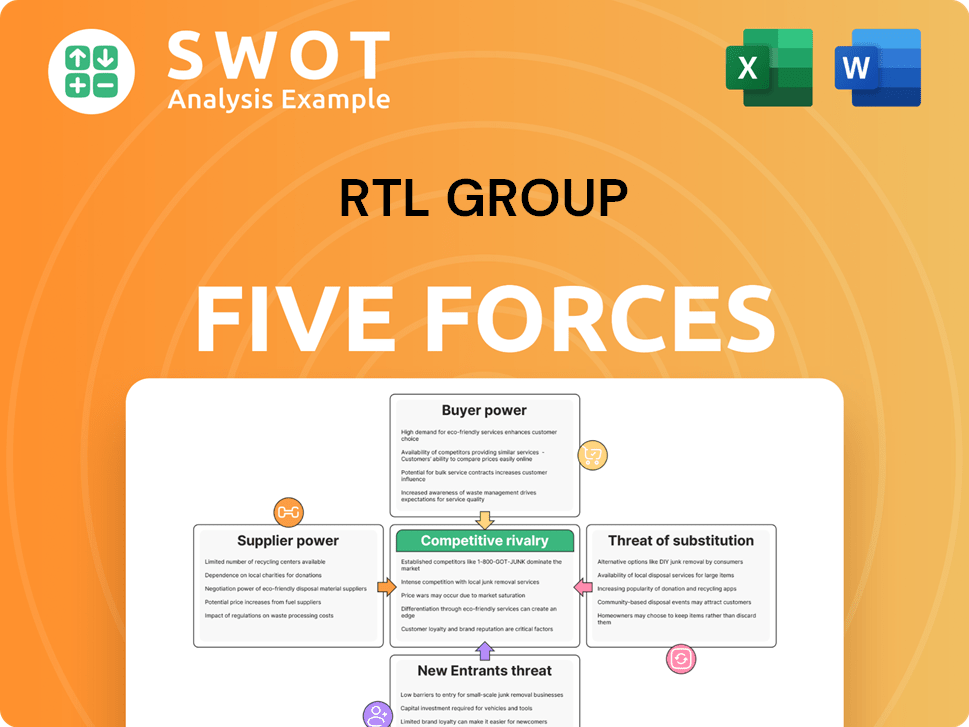
Related Blogs
- What are Mission Vision & Core Values of RTL Group Company?
- What is Growth Strategy and Future Prospects of RTL Group Company?
- How Does RTL Group Company Work?
- What is Sales and Marketing Strategy of RTL Group Company?
- What is Brief History of RTL Group Company?
- Who Owns RTL Group Company?
- What is Customer Demographics and Target Market of RTL Group Company?
Disclaimer
All information, articles, and product details provided on this website are for general informational and educational purposes only. We do not claim any ownership over, nor do we intend to infringe upon, any trademarks, copyrights, logos, brand names, or other intellectual property mentioned or depicted on this site. Such intellectual property remains the property of its respective owners, and any references here are made solely for identification or informational purposes, without implying any affiliation, endorsement, or partnership.
We make no representations or warranties, express or implied, regarding the accuracy, completeness, or suitability of any content or products presented. Nothing on this website should be construed as legal, tax, investment, financial, medical, or other professional advice. In addition, no part of this site—including articles or product references—constitutes a solicitation, recommendation, endorsement, advertisement, or offer to buy or sell any securities, franchises, or other financial instruments, particularly in jurisdictions where such activity would be unlawful.
All content is of a general nature and may not address the specific circumstances of any individual or entity. It is not a substitute for professional advice or services. Any actions you take based on the information provided here are strictly at your own risk. You accept full responsibility for any decisions or outcomes arising from your use of this website and agree to release us from any liability in connection with your use of, or reliance upon, the content or products found herein.